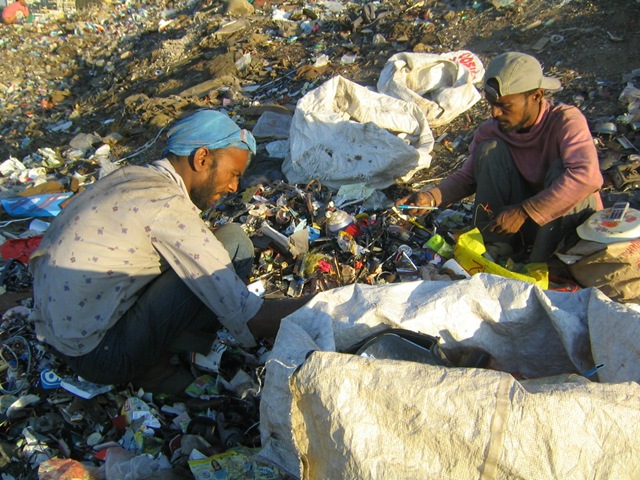Your cart is currently empty!
Day: October 12, 2010
-

Project Dharavi: Waste Matters for Green Workers

Dharavi, Asia’s largest slum, is a haven of dry waste- huge mounds of plastic bags, papers, scraps…It is also a home to several migrant workers, ragpickers and destitute, and is probably the world’s largest recycling quarters where almost 80% of the dry waste generated in the city is segregated for recycling into reusable products.
Amidst a pile of discarded mobile phones, chargers, tangled wires, computer spare parts and other electronic waste lives young Shafiq. Dharavi is his home and he has been sifting through these piles since childhood. “My job is to separate every part of the electronic gadget that is dumped here. The plastic and the metal generated from the electronic items is further segregated and then sold to the kabadiwallas. By selling e-waste, I earn a decent amount of money from which I can feed my family.”
Like Shafiq, there is Mangala, diligently scanning each plastic waste dumped at the Dharavi swamp. Sitting in one corner, she sieves the dust, dirt and mud from the plastic items. “I have lost count…I have spent years in this business. This waste gives us a livelihood. If I work from 9 to 6 every day, I can fill my stomach easily.”
Laxmi and several others form the recycling clan of Dharavi, and they are all part of Acorn Foundation (India), Mumbai, a registered charity trust affiliated to ACORN International/ Association of Community Organizations for Reform Now.
Hundreds of children, women and men collect dry waste from the streets, beaches and garbage dumps every day. They bring the waste to Dharavi, where it is sorted, segregated and then sold by the kilo to scrap dealers at various godowns. This waste can get them anywhere between 10 rupees per kilo for e-waste, to 12 rupees per kilo for plastic bottles, or 20 rupees per kilo per metals like copper from circuit boards.
This unorganized labour of Dharavi is an invaluable asset to the city. “If it were not for these ragpickers who recover, recycle and ensure reuse of the waste, Mumbai would have been reduced to a dump yard with serious issues,” says Vinod Shetty, Director of Acorn Foundation (India), Mumbai.
The dry waste like plastic, glass, cloth and paper are segregated and sent to the recycling units in Dharavi, where they are made into reusable products. The plastic waste is converted into pellets; these pellets are further processed and made into folders and buckets. The paper and cardboard is turned into pulp which is used to make folders and furniture. The metal generated from the e-waste is used for industrial purposes.
The society seems to have a “don’t care” attitude towards waste. “Handling waste is probably the dirtiest thing but we forget that we generate that waste. The problem is with our attitude, we don’t take waste as our problem but instead we put it under the carpet or expect others to clean our mess.”
With a nominal fee of 60 rupees, the organization has engaged 400 working members from Dharavi Project. In return, the members can also learn music, art, and photography. Acorn provides informal schooling to the ragpickers’ children, organizes health camps, arranges ration cards, conducts workshops on waste segregation and holds cultural programmes. “At Acorn, we address them as ‘green workers’ and not as ragpickers”
Acorn has also involved school children in waste segregation. It conducts programmes for students on how to reduce and manage waste at home. It screens visuals and documentaries at various schools. Acorn also runs this campaign with CMCA (Children’s Movement for Civic Awareness) and Lions Club of Juhu.
“We work with Dhirubhai Ambani School, the American School, the RBK School and even schools at Navy Nagar in Colaba. We have temps who go around the city and collect dry waste from the schools. It is a contribution by school children to the livelihood of the ragpickers. This is an ideal model where the child learns about segregation of waste, about the environment and, of course, the green workers, ” says Vinod. “The school children also get to tour the recycling industry of Dharavi to understand the concept of waste management better. We would also like to involve college students in our project in the future.”
Acorn study has found that more than 50% of the ragpickers earn less than 50-60 rupees a day. These ragpickers are vulnerable to health related issues and even exploitation. Vinod aspires to represent the plight of ragpickers to the government. He aims to set up a statutory board through which the government could introduce insurance schemes, distribute equipment like gloves, masks and other scavenging materials, and provide space in every municipal ward to segregate waste.
“Our next agenda is to clean the beaches of Mumbai. We want to involve citizens and communities from well-to-do societies. Our members are ready to assist these groups in managing waste,” concludes Vinod.
